
In New Jersey, a single AI-generated image, audio clip, or video could now land you in criminal court. With deepfake technology becoming more accessible, state lawmakers passed a robust law to curb deceptive media that can cause real harm. While some deepfakes are meant for harmless fun or parody, others are dangerous, misleading, or exploitative. Producing or sharing these with harmful intent can now lead to serious legal consequences.
At Attorneys Hartman, Chartered, we understand how deeply unsettling these accusations can feel. If you are accused under this law, it matters that you grasp the life-changing penalties involved, how a case might be built against you, and the defense options available to protect your rights.
What Are Deepfakes?
“Deepfake” refers to AI-generated media that makes it appear someone said or did something they never actually did. These manipulated creations can range from altered celebrity videos to fraudulent political messages or even fabricated evidence in personal disputes.
Deepfakes are often used for entertainment or parody, but they can also be weaponized for:
- Harassment or blackmail
- Revenge porn or sexual exploitation
- Political misinformation
- Identity theft or financial scams
In the statute, a deepfake is defined as media that appears realistic to a reasonable person but depicts speech or conduct the person did not actually do, where the depiction is substantially dependent on technical means rather than live impersonation. New Jersey lawmakers recognized these dangers and enacted the law to address both targeted personal harm and broader public deception.
Key Provisions of New Jersey’s Deepfake Law
The law makes it a crime to generate, use, solicit, or disclose a deepfake to attempt or further another crime or offense, or with knowledge that it will be used for that purpose. There is also a separate offense for knowingly or recklessly disclosing a deepfake that you know or should know was created in violation of the statute. Some of the main provisions include:
Criminalization of Nonconsensual Sexual Deepfakes
Creating or distributing explicit deepfakes of someone without their consent is a criminal offense. This provision specifically targets revenge porn, a growing issue worsened by AI manipulation.
Improper Influence in Political Matters
Deepfakes used to threaten or improperly influence official or political matters can trigger charges under this law, consistent with N.J.S.2C:27-3.
Crimes Included by Reference
The statute incorporates existing offenses. Using deepfakes in connection with harassment, cyber-harassment, false public alarms, hazing, endangering the welfare of children, or advertising commercial sex abuse of a minor may lead to charges.
Criminal Penalties Under the Law
Violations of New Jersey’s deepfake law are indictable offenses (felonies). Depending on the conduct, penalties may include:
- Fourth-degree crime: Up to 18 months in prison, and a fine of up to $30,000.
- Third-degree crime: 3 to 5 years in prison, and a fine of up to $30,000.
Judges may also order restitution, requiring defendants to compensate victims for emotional, reputational, or financial harm. Convictions under this law do not merge with underlying offenses, and courts must impose separate consecutive sentences in certain circumstances.
In addition, victims may pursue civil lawsuits. Available remedies include actual damages, liquidated damages of at least $1,000 per knowing or reckless violation, punitive damages, reasonable attorneys’ fees, and injunctive relief.
How Prosecutors Build Their Case
To convict someone under the deepfake law, prosecutors must typically show:
- The accused knowingly created, used, solicited, or disclosed the manipulated content.
- The deepfake was intended to further or commit an unlawful act such as harassment, cyber-harassment, false public alarm, or improper political influence.
- Evidence clearly links the accused to the creation or sharing of the media.
Prosecutors may rely on digital forensics, IP address tracing, social media activity, and emerging AI detection tools to support their cases.
Defending Against Deepfake Charges
Being accused of a deepfake-related crime does not mean you are automatically guilty. Common defenses may include:
- Lack of intent: Demonstrating that you did not knowingly create or distribute harmful content.
- Protected expression: Using deepfakes for satire, parody, commentary, or artistic expression, which may fall under constitutional protections.
- AI tool reliability: Challenging the accuracy of AI detection methods, which are still developing and may produce errors.
- Insufficient evidence: Arguing the state has not met the burden of proving you were responsible.
- Mistaken identity or hacking: Showing that someone else accessed your accounts or devices.
The statute itself recognizes exceptions for clearly labeled works and protects news reporting, commentary, criticism, satire, parody, teaching, scholarship, and research. It also provides limited safe harbors for certain platforms and publishers that use proper disclaimers.
Because these laws are new, courts are still determining how to apply them. At Attorneys Hartman, Chartered, we stay current with both evolving legal standards and advancing technology to craft defenses that are both strategic and grounded.
Why This Law Matters Now
Deepfakes are increasingly common and potentially destructive. What may start as a bad joke or misjudged experiment could turn into a criminal charge with long-term consequences. Beyond prison time and fines, a conviction could harm your reputation, career, and personal relationships.
If you are under scrutiny, acting promptly can make a difference. Early legal guidance protects your rights and gives you the best chance to manage the path ahead.
Charged Under New Jersey’s Deepfake Law? Know Your Defense Options
New Jersey’s deepfake law is among the strictest in the country, and a conviction could affect your freedom, employment, and reputation for years to come. These cases move quickly, and prosecutors often rely on new and sometimes unreliable AI detection tools to prove their claims.
At Attorneys Hartman, Chartered, we know how complex these cases can be. We stand with clients in evaluating evidence, building a strong defense, and navigating both criminal and civil aspects of the law. We defend clients facing criminal charges under New Jersey’s deepfake law in Burlington County, Mercer County, and throughout the state. Do not wait. Fill out this contact form to schedule a consultation and let us help protect your rights today.
Disclaimer: The articles on this blog are for informative purposes only and are no substitute for legal advice or an attorney-client relationship. If you are seeking legal advice, please contact our law firm directly.
